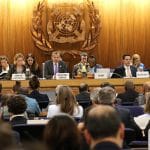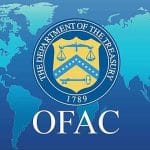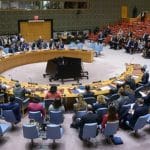In the collective daydreams of Central Asian presidents, there is no end to the possibilities for regional integration.
The ideas came thick and fast at the latest semi-formal get-together of Central Asian leaders, held this year in the capital of Tajikistan, Dushanbe.
In his speech at the fifth heads of state consultative meeting on September 14, Kazakhstan’s President Kassym-Jomart Tokayev focused his thoughts on how to promote more trade.
“The business communities of our countries should be the main drivers for increasing trade turnover. And so, creating a propitious environment for them must be a priority,” he told his colleagues, who this year also included a special guest, Azerbaijan’s President Ilham Aliyev.
Tokayev’s notion is to build on the model of the Central Asia Gateway, a recently created online one-stop platform for entrepreneurs seeking guidance on the bureaucratic complications entailed in importing and exporting goods in the region. A unified electronic database of commodity producers could serve as a resource for businesses looking to establish connections, find partners, and engage in cross-border trade, he argued.
“Over the past five years, intraregional trade turnover has grown by more than 80 percent, reaching $10.6 billion. I am convinced that this is not the limit. Our countries have enormous potential to further develop trade,” Tokayev said. “Our countries have a chance, in the near future, to increase mutual trade turnover to $15 billion.”
Another set of figures mentioned earlier in the day, at an economic forum in Dushanbe, indicate that much of this traffic goes through Kazakhstan. As Kazakh National Economy Minister Alibek Kuantyrov said at the event, his country’s trade turnover with Central Asian countries in 2022 amounted to $7.9 billion, a 25 percent increase on the year before.
“It is important to form an efficient network of regional supply chains,” said Kuantyrov, adding that there are 300 types of goods that Kazakhstan could be trading with its neighbors.
Turkmenistan’s President Serdar Berdymukhamedov came to the meeting with a complementary proposal – one that has become something of an idée fixe for Ashgabat.
“[The proposal is] to consider the possibility of launching a Central Asian transport and logistics platform, the main objective of which could be to … create transportation hubs in the region, form transit corridors and increase the efficiency of existing ones, and optimize and harmonize customs, migration and other procedures along international transport routes going through our states,” he said.
Uzbek President Shavkat Mirziyoyev put what is at stake in terms of the financial costs.
“Taking into account the distance from [our] main foreign markets, the proportion of outlays for transporting goods from our countries reaches 50 percent of the final cost of the product. That is while the global average does not exceed 11 percent,” he said. “This means our economies are forced to bear a transportation burden two to three times greater than that borne by developed countries.”
As trade experts point out, for any item to get from Central Asia to an end-buyer outside the region, it needs to cross multiple tariff hurdles, piling on costs at every stage.
“We need to create mechanisms for promoting efficient transport corridors to enter the markets of China, South Asia, the Middle East and the European Union by enacting end-to-end tariffs,” the Uzbek president said.
But lofty aspirations like these invariably go astray somewhere between the drawing table and the chancelleries of Central Asian governments. Observers of the integration agenda will, therefore, watch with interest to see if there is any uptake on Mirziyoyev’s intriguing suggestion to establish an Economic Council of Central Asian States. While this mooted entity sounds nothing quite as structured as already-existing blocs like the Russian-led Eurasian Economic Union, which counts Kazakhstan and Kyrgyzstan among its members, it is possibly being conceived as initial stepping stone in that direction.
In the meantime, the presidents did sign off on the creation of a joint commission to monitor implementation of the terms of an Agreement on Strengthening Interconnectivity of Regional Overland Transportation. Transport officials from all five countries will be represented on the commission.
The difficulty in kickstarting region-wide initiatives has historically been that any such undertaking is only ever as strong as its weakest link.
And Kyrgyzstan’s President Sadyr Japarov raised some eyebrows by deciding to duck out of what was scheduled as two days of discussions on the first day.
His contribution to the potluck institution-building proposals session was to suggest setting up a regional center for the promotion of energy-efficient and resource-saving technologies. This body would be headquartered in Bishkek and lobby for the rational use of water and energy resources, he said.
The force of this idea was somewhat compromised, though, by his decision to skip a meeting of heads of state of founder nations of the International Fund for Saving the Aral Sea, which took place on September 15. By the time the other four presidents had convened for these talks, Japarov was back in Bishkek.
The host, President Emomali Rahmon, was also thin on firm ideas and opted instead to strike something of a sour note by complaining of the purported dangers of media coverage of developments in Central Asia.
“The media landscape is full of the most diverse, contradictory and inaccurate information about the state of affairs in the region,” he said.
That description can hardly be said, though, to apply to Tajikistan, whose independent press has been all but entirely squelched by waves of repression at the hands of the security services. Rahmon’s remarks sounded in reality like an exhortation for the region’s governments to join hands in further repressing political freedoms.
The five presidents saw one another again during the historic Central Asia-US Summit, the C5 + 1, as President Joe Biden described it, on the sidelines of the annual UN General Assembly in New York.

Russian experts are eager to generate traction, however, for the idea that one or more leaders may fail to turn up out of reluctance to be strong-armed by Washington on the question of more stringently complying with sanctions leveled by the West against Moscow in response to the invasion of Ukraine.








